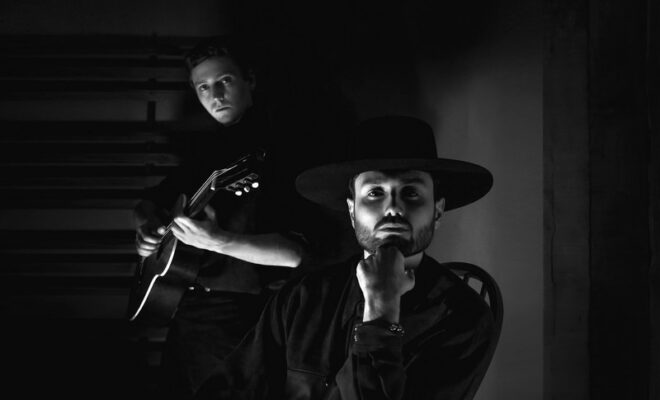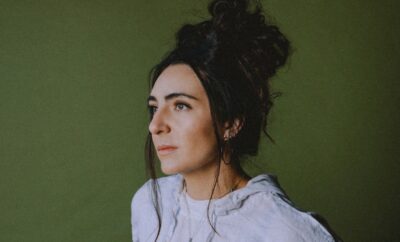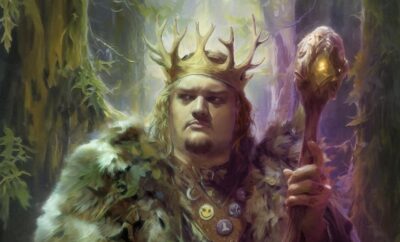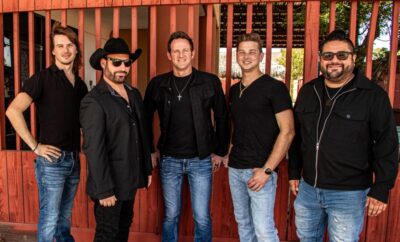 Ruen Brothers
Ruen Brothers
Interviews
Ruen Brothers – Ten Paces
By: Dianca Yssel
Ruen Brothers recently released their third full length album, Ten Paces, via Yep Roc Records – LISTEN HERE. Throughout the album, the Scunthorpe, England-raised duo – Rupert and Henry Stansall – create a thoroughly modern sound while embracing their love of American Westerns. Read their interview with Starry Constellation Magazine below and see them on tour this July, including a show at New York City’s Central Park SummerStage with Café Tacvba.
Q) Your sound harkens back to a rock and roll past, but with a modern urgency. What inspired your sound?
A) Everything from our dad’s record collection. We started performing covers of it around our hometown and the audiences loved them. It encouraged us to dig deeper into the past. All being said, our youth and the modern technology that surrounds us likely led to the new-old hybrid sound.
Q) Your musical influences are the likes of Roy Orbison and Johnny Cash. What about these artists resonates with you?
A) We feel there’s a sincerity and depth to them which comes out in their songs and singing. What they sang about was real and believable. Being from a rural and industrial part of the UK, the language spoke to us. There’s a timeless quality to their songs and recordings, and the melodies and instrumentation which we love also.
Q) Congratulations on your newly released single “Bullet Blues.” The song is said to liken a relationship to a duel. Talk about the story behind it.
A) The songwriting was quick. It flowed very fast and depicting a relationship like a duel proved quite easy. It stemmed from no particular experience but seemed to just come out of us both simultaneously when trying to write something. We believe the melody came first, as it usually does, and then some vowel sounds and the lyrics hit the page from there, effortless. From there we were thinking about the delivery. We liked the idea of moving the song from soft, intimate and acoustic towards a fully produced crescendo, it took a little while in the arrangement, but we got there.
Q) You shot and self-directed the music video for “Bullet Blues,” which features a lone cowboy watching a neon crescent moonlight against the wall. What was the creative thinking behind the video and how does it enhance the subject matter of the song?
A) Cinema is a big inspiration to our music, and we thought it would be fitting to connect the two in some way, especially using this song – we always thought it would be suited to the closing credits of a sad movie. We depicted it with a projector, text and someone (Henry) watching it roll.
Q) What is your creative process when making new music? Do you need lyrics before adding music?
A) Usually music and melody first, then vowels form, sometimes simultaneously with a phrase, before lyrics start embedding themselves. The lyrics take the longest, and we often get an outline of the meaning, context and maybe a few chorus lyrics before putting the song down a while – continuing whenever we’re inspired. Sometimes we’re swapping out lyrics whilst recording.
Q) You just announced your third full-length album, Ten Paces, scheduled to be released in June. Ten Paces is said to be a moody ode to the American Westerns you grew up watching, but with a modern spin. What themes are you exploring with the album?
A) Noir and Western merge, with western motifs and noir imagery. Basically, the two genres we love the most. The only modern element is our recording process.
Q) What is the story behind the album name Ten Paces?
A) It actually comes from a chorus lyric from our song “The Good Surely Die,” which speaks of the end of a relationship with Western metaphors. There’s also ten songs on the album, so we thought it was fitting.
Q) How did you ensure that Ten Paces has a classic Western feel, while still keeping it modern?
A) We use many old techniques and equipment, albeit it all gets compiled and mixed with modern software. The software also allowed us to explore vintage instruments and sounds that are hard to come across, enabling us to decorate and build a soundscape that evokes a mid-century western sound and desert scene.
Q) The album is influenced by Marty Robbins’ “Gunfighter Ballads and Trail Songs.” What about these songs resonates with you and how have you incorporated that into it?
A) The delivery, acoustic quality and reverb of “Gunfighter Ballads and Trail Songs” sets the scene. Similarly, we wanted our album to place the listener in a comparable environment.
Q) You recorded Ten Paces on opposite sides of America, with the base of the recordings done from Rupert’s studio in Los Angeles and Henry bringing the acoustic guitar and vocals all the way from Brooklyn. How do you manage to remain creatively in sync with all that distance between you?
A) The songwriting was relayed over ZOOM, Google Docs and Voice Notes. The recording was quite easy; we have mirrored recording setups, so after Ru created basic guide tracks, we were both able to add our separate parts over the top simultaneously. After each session, the parts were sent to Rupert’s to be layered up and arranged further.
Q) What do you hope your fans will take away or lingers with listeners when exploring Ten Paces?
A) We implore people to listen to the record late in the evening, under the glow of a warm light. We want them to experience the darkness in the songs, with visions of a western landscape.
Q) You have written music for the silver screen including Blumhouse’s Adopt a Highway, Netflix’s award-winning romantic comedy The Half of It and the full score for indie feature Going Nowhere. Is writing songs for TV or Film something you wish to pursue more of in future?
A) 100%. It’s at the core of our inspiration, and we’ve nodded to it our whole career. It also employs all of our musical skills and passions for arranging and recording.
Q) You have performed opening sets for the likes of George Ezra, Tom Odell, Greta van Fleet and Nikki Lane. Is there an artist who you would really love to collaborate with on a song in future?
A) Hans Zimmer or Danny Elfman would be cool.
Q) What would you like to say to your fans and supporters of the music that you make?
A) It’s cool that you “get” and appreciate what we are doing. Thank you!





You must be logged in to post a comment Login